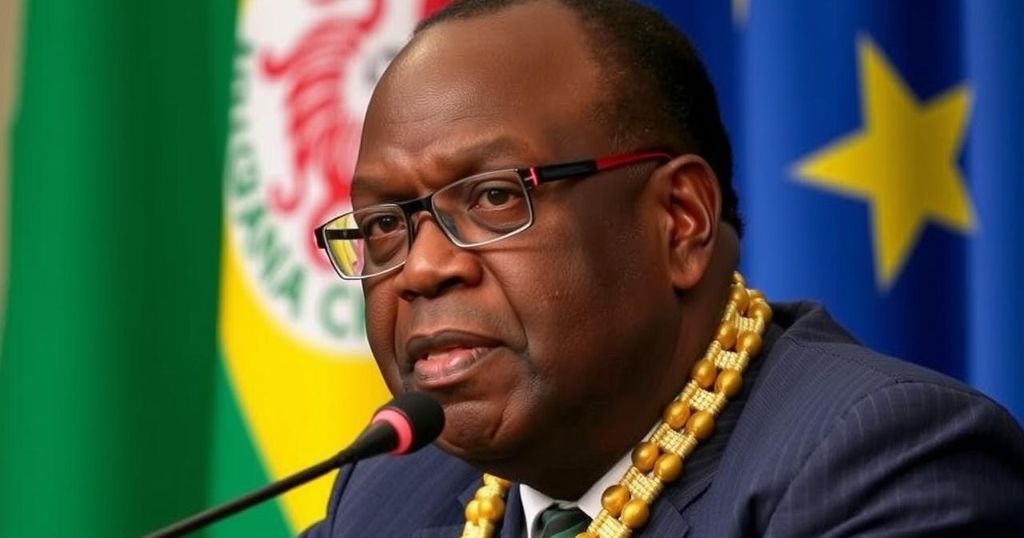The Speaker of Parliament, Alban Bagbin, has asserted that the current parliamentary impasse does not constitute a constitutional crisis, contrary to statements made by Chief Justice Gertrude Torkornoo. The situation arose after the Supreme Court dismissed Bagbin’s attempt to declare four parliamentary seats vacant, emphasizing the need for graceful resolution rather than judicial escalation.
The Speaker of Parliament, Rt. Hon Alban Bagbin, has recently reassured both the media and the public that the ongoing parliamentary situation does not equate to a constitutional crisis. His comments were made following a Supreme Court ruling that dismissed his attempt to invalidate a prior decision that prohibited him from declaring four parliamentary seats as vacant. He expressed his belief that the circumstances should be resolved through thoughtful discussion, rather than escalating matters to the judiciary. “There’s no constitutional crisis in this country. I repeat, there’s no constitutional crisis in this country,” he insisted, advocating for a more peaceful approach to governance. Speaker Bagbin reiterated Parliament’s constitutional authority to revoke the seats of members who have either switched party allegiance or intended to contest the upcoming elections as independents. He further accused both the Executive and the Judiciary of collaborating to diminish Parliament’s authority amid these recent tensions. On the contrary, Chief Justice Gertrude Torkornoo labeled the issue of the four contested seats as a constitutional crisis that requires immediate attention. During court proceedings on October 30, 2024, she raised concerns regarding delays in the judicial proceedings, pressing for urgency in filings required from Speaker Bagbin’s legal representation. She stated, “This is a constitutional crisis; we’re living in a country where Parliament is not sitting. What is going on?” Furthermore, the Attorney General, Godfred Yeboah Dame, posited that Speaker Bagbin ought to be excluded from the case, emphasizing that his office’s jurisdiction pertains to issues involving public servants and constitutional adjudication. Justice Torkornoo thereafter granted Speaker Bagbin a deadline until November 6, 2024, to submit necessary documents, responding to Sory’s request for more time to confer with Bagbin about the substantive case. Subsequently, the Supreme Court rejected an application from Speaker Bagbin that sought to reverse a ruling suspending his declaration concerning the vacant parliamentary seats, following a lawsuit initiated by Effutu MP Alexander Afenyo-Markin that challenged the Speaker’s decision. Bagbin’s legal representation contended that the apex court lacked jurisdiction on this matter.
The current situation in Ghana’s Parliament arises from a dispute regarding the status of four parliamentary seats, with Speaker Alban Bagbin attempting to declare them vacant due to specified circumstances involving the Members of Parliament. This disagreement has led to conflicting interpretations between the legislative and judicial branches of government, particularly following a recent Supreme Court ruling that obstructed the Speaker’s actions. The tension has raised significant concerns regarding the authority of Parliament versus the Judiciary, prompting public officials, including the Chief Justice, to weigh in on the implications of this conflict for governance in Ghana.
In light of the unfolding situation in Ghana’s Parliament, Speaker Alban Bagbin remains steadfast in affirming that there exists no constitutional crisis, despite claims to the contrary by Chief Justice Gertrude Torkornoo. The debate highlights a critical constitutional conflict regarding the separation of powers between the Legislative and Judicial branches, further underscoring the need for calm, deliberation, and adherence to legal processes. As these proceedings continue, the outcome will undoubtedly impact the functions of Parliament and its authority moving forward.
Original Source: www.ghanaweb.com






